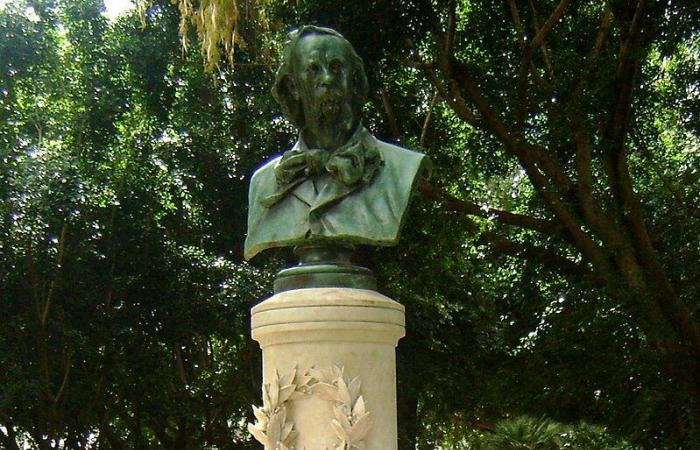
In times like today, in which we believe we have some relevance by Instagramming ourselves with the electoral card (not to push others to vote, but positioning ourselves as the “civilized” ones), one wonders what space a man like Mario Rapisardi (1844-1912)born in Catania and died in Catania. A man of letters with an apparently bristly character, who didn’t appreciate anyone, hating any type of pose. Someone who perhaps deserves more than a city that dedicated a school to him, making him immortal in the mouths of citizens, while educational programs (in the city, but not only) often look elsewhere when talking about him. So much so that the Avenue that bears his name is simply called Avenue.
An enjoyable article for The Sicilian Post written by Joshua Nicolosi points out how the Vate Etneo (aka Rapisardi) we “often tend to underline the angularity of the character”, and it almost makes you want to hug the good Nicolosi and compliment him on his candor. But maybe we still remembered the character of the great poets, but maybe we still remembered that poets were poets, even around the corner from our house.
Mario Rapisardi’s gossip
Since we know nothing about any topic, We ignore even the most tormented gossip about Rapisardi, that is: the liaison between his wife, the Tuscan writer Giselda Fojanesi, and his beloved enemy Giovanni Verga. Having arrived in Sicily, the cultured Fojanesi (talented writer and friend of personalities such as Matilde Serao and Ferdinando Martini) found herself in a hostile and provincial environment compared to the Florentine salons, finding in Verga’s sensitivity the only remedy for a husband with a impossible and to a narrow-minded mother-in-law – things never change, we still know nothing about anything, and the bad things are the same as a hundred-odd years ago. Verga, to Fojanesi, would have dedicated one of the Novelle Rusticane (the marvelous “Beyond the Sea”) while Fojanesi, after the breakup of her marriage with the Pope, would have had an enviable career in the field of writing and teaching, but these those are other stories.
Mario Rapisardi had an impossible and difficult character. He didn’t like anyone but himself, and he had no intention of being liked, regardless of his disastrous marriage. Like many of those with such a soul, however, he disgusted everyone even though he wanted to be loved. The non-conformist soul had not been introjected from anyone, although he loved seminal authors such as Alfieri and Leopardi, a great admirer of the latter, so much so that he changed his surname from “Rapisarda” to “Rapisardi” to seek an easy rhyme with that of from Recanati.
Rapisardi today would not find an easy place in the bouquet of intellectuals or content creators who talk pompously in front of a cell phone that takes videos, given that according to him “there is nothing remarkable in my life, except perhaps this, that for better or worse, I have formed myself”. Something similar would be written by mythomaniacs on social networks that have gone out of fashion, certainly not someone who, as an adolescent, writes odes to Sant’Agata and Risorgimento hymns, who publishes a first volume of verses at not even twenty years old, just before starting to frequenting the Florentine literary salons, where he met figures such as Aleardo Aleardi and Francesco Dall’Ongaro. The same one Rapisardi who has a complex relationship with God and religion: when in 1868 he signed the poem “La Palingenesi”, which earned him a gold medal and the chair of Italian literature at the University in Catania, the Pope dreamed of a return to a pure Christianity, completely amended by the filth of corruption.
Be the beginning of you, unconsumed light / Of Truth: coeval with God you shine / For the night of time, and you reveal to me
Because of what a long shadow of deception was drawn/The wayward suffering humanity/When, foolishly, it forgot its celestial
Origin, on his unhappy head/ The righteous provoking God’s wrath.
Over the years, Rapisard’s relationship with religion and those who administer it became increasingly complex: when in 1877 he published the poem “Lucifer” in Milan, he even antagonized the archbishop of Catania who the index would have dreamed of, for the work . Rapisardiwho in the meantime even earned the esteem of Victor Hugo, it exalts rationality over superstition and obscurantismwith science and progress as healthy bearers of a new truth that eats up the hypocrisy of the most brazen clericalism.
In Canto Own the Catanian would have started a very bitter feud with Carducci consumed to the sound of verses in works scattered here and there, in which the Nobel Prize winner defines Rapisardi as “village from Catania”, and many other malice reciprocated (it would be nice to delve deeper into it, but it would have been nicer if someone had stuck Rapisardi in the school curriculum instead rely on newspapers).
Mario Rapisardi practically doesn’t like anyone, neither Carducci nor the Church nor many of his most illustrious colleagues, but he is a formidable translator (Lucretius, Catullus but also Shelley) and a man who knows controversy and nuances. He knows he is much loved by his fellow citizens for his polemical attitude, he is adored by students, but his satirical vision of the future makes him understand that, as with God, trust and hope can also be lost towards men of letters polemicists. While others rise to the rank of immortals, Rapisardi embraces the socialist cause, and in the late nineteenth-century part of his career he exalts even more the strength of science but also the working class, exploited by the most powerful, and the desperation of the least (the collection of poems “Justice” and the poem “Job”, in this, are some of the most significant examples).
To the point of calling himself, Etna’s poet, in the poem “L’Atlantide” (“That disdainful one standing upright on the deck (…) He is the Etna’s poet, who like a sword has straight/The soul, the heart burning, the rhymes ready” ) of 1894, having now understood that he could no longer access the treasure chests of legend but only the knowledge of scholars and small enthusiasts, without however having ever given up on the idea of perceiving himself as the best, or rather: the one who had seen the most for a long time of everyone, with the decay, the hypocrisies, and the endearments of a society that makes itself beautiful without recognizing that it is rotting, in which perhaps even the intellectuals must understand well what their real missions are.
Rapisardi died in 1912 after letting Filippo Tommaso Marinetti know that he didn’t give a damn about Futurism because the poet’s obligation is not to join movements or schools but to express himself with sincerity. In the city, the duel between oblivion and remembrance has always been played out over his name. Mario, who wanted to be remembered, is constantly on the lips of the people of Catania, because of the school in Viale Vittorio Veneto; those same people from Catania who, in an absurd game of scripts that life creates, take away his name and surname in reference to another avenue, perhaps the most famous in the city, named after him. They are the people of Catania, beauty.





